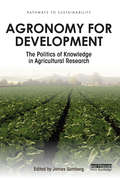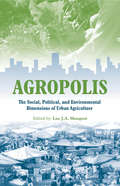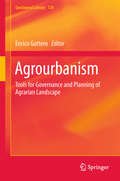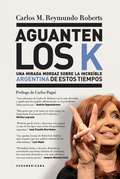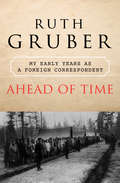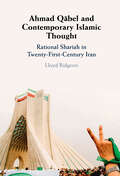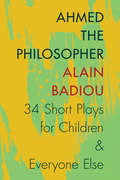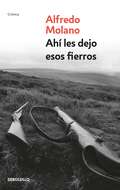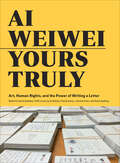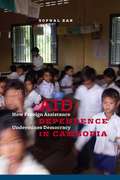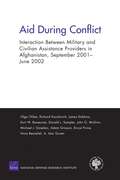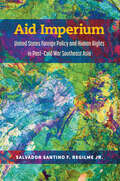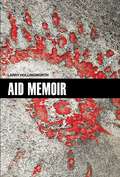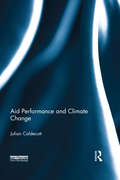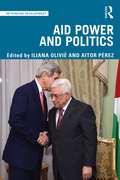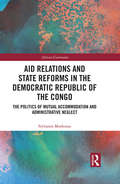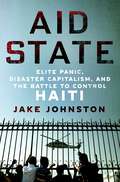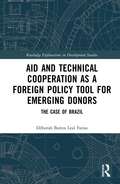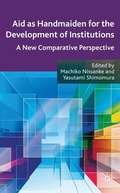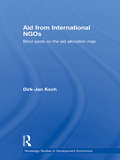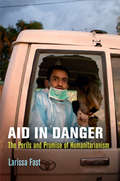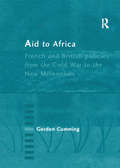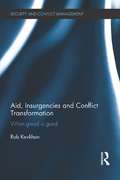- Table View
- List View
Agronomy for Development: The Politics of Knowledge in Agricultural Research (Pathways to Sustainability)
by James SumbergOver the last decade there has been renewed interest in food security and the state of the global food system. Population growth, climate change and food price spikes have combined to focus new attention on the technologies and institutions that underpin the production and consumption of food that is varied, nutritious and safe. Knowledge politics within development-oriented agronomy set the stage for some models of agricultural development to be favoured over others, with very real implications for the food security and wellbeing of many millions of people. Agronomy for Development demonstrates how the analysis of knowledge politics can shed valuable new light on current debates about agricultural development and food security. Using bio-physical and social sciences perspectives to address the political economy of the production and use of knowledge in development, this edited collection reflects on the changing politics of knowledge within the field of agronomy and the ways in which these politics feed and reflect the interests of a broad set of actors. This book is aimed at professionals working in agricultural research as well as students and practitioners of agricultural, rural and international development. ?
Agropolis: "The Social, Political and Environmental Dimensions of Urban Agriculture"
by Luc J MougeotUrban agriculture is an increasingly popular practice in cities worldwide. A sustainable future for it is critical, especially for the urban poor of the developing world. This book presents the first findings of original field research projects funded by IDRC's AGROPOLIS International Graduate Research Awards on Urban Agriculture. Countries studied include Argentina, Botswana, C?te d'Ivoire, Cuba, France,Togo,Tunisia, the UK and Zimbabwe.Together, these studies examine concrete strategies to better integrate 'city farming' into the urban landscape.
Agrourbanism: Tools for Governance and Planning of Agrarian Landscape (GeoJournal Library #124)
by Enrico GotteroThis book provides a much needed overview of the agrourbanism topic in the context of territorial studies. It carefully looks at rural, urban, periurban farming in both professional and unprofessional capacities as one of the main sustainable forms of land use and management. This cutting edge text explores the various forms of agricultural and urban planning, as well as the main innovations that the agro-urban approach entails in terms of governance, spatial dimensions and functions. Agrourbanism provides a breadth of information and serves as a practical study of concerns facing policy and decision makers, planners and landscape managers, as well as farmers, managers of protected areas, local authorities and local action groups. As such this book is suitable as a course accompaniment to provide an overview of the complexity of agro-urban issues.
Aguanten los K: Una mirada mordaz sobre la increíble Argentina de estos tiempos
by Carlos M. Reymundo RobertsEl personaje es un liberal del diario La Nación que se hizo "K", que seesfuerza por ser un militante y no es aceptado, hecho que da pie a unamirada crítica y humorística de la realidad política del país. El autores el prosecretario general de redacción del diario La Nación. El libro reúne las columnas publicadas por en la sección «De no creer» ylos comentarios de los lectores. El personaje creado por ReymundoRoberts se sueña K y no logra serlo, o no logra ser aceptado como tal, yesa tensión es la que confunde, enoja y encanta. Así es que los foros delanacion.com estallan con vítores, insultos y signos de interrogación.Como dijo el periodista Carlos Pagni en el prólogo de «Aguanten los K»:"La ficción puede convertirse en un instrumento inigualable deindagación de la realidad".Pagni elogió que el autor haya descubierto la "mejor forma" de describirla realidad política del país, que es "matándose de risa". Así,consideró que "el kirchnerismo, que dramatiza todo y por su matrizautoritaria, no entiende el humor y lo ofende mucho". Añadió: "Roberts,siguiendo una tendencia de su personalidad, a través del humor consiguecriticar sin agredir, lo cual es un hallazgo en momentos en que nosquieren meter en la trampa de una guerra".
Ahead of Her Time: Abby Kelley and the Politics of Antislavery
by Dorothy Sterling"[The author] tells this remarkable story with honesty and compassion. Readers will find a wealth of new information not only about Kelley's outstanding contribution to abolitionism but about the movements to bring about the end of slavery and to advance the cause of women." --Mari Jo Buhle, Brown University In the tumultuous years before the Civil War, a young white woman from a Quaker background came to embody commitment to the cause of antislavery and equal rights for black people. Abby Kelley became the abolitionist movement's chief money-raiser and organizer and its most radial member. She traveled hundreds of miles to awaken the country to the evils of slavery, braving hardship and prejudice as well as opening the way for other women, black and white, to take leadership roles. Now the full story of this principled woman has been told in Dorothy Sterling's compelling biography.
Ahead of Time: My Early Years as a Foreign Correspondent
by Ruth GruberThe renowned journalist and Jewish activist looks back on her first 25 years in &“one of the most evocative journalistic autobiographies to appear&” (Publishers Weekly). In this fascinating memoir, Ruth Gruber recalls her first twenty-five years, from her youth in Brooklyn to her astonishing academic accomplishments and groundbreaking journalistic career. She shares her experiences entering New York University at fifteen and just five years later becoming the world&’s youngest person to earn a PhD. She recounts her time in Cologne, Germany, studying during Hitler&’s rise to power, and her adventures in Europe and the Arctic as a reporter for the New York Herald Tribune. Spirited and compelling, Ahead of Time is a striking account of the early years of a woman at the center of the twentieth century&’s turning points.
Ahmad Qābel and Contemporary Islamic Thought: Rational Shariah in Twenty-First-Century Iran
by Lloyd RidgeonAhmad Qābel (1954–2012) was one of the key figures in the 'New Religious Thinking' trend of reformist thought, whose radical views were some of the most daring of his generation, seeking to rationalize and modernize Islamic law. In this comprehensively researched and accessibly written book, Lloyd Ridgeon offers an original examination of Qābel's writings, including his seminal work Shari'at-e 'Aqlāni (Rational Shariah). Throughout his career, Qābel crossed many political and religious redlines, resulting in several prison terms and hastening his premature death while under hospital arrest. Chapters covering topics from jurisprudence and politics to gender relations and society unravel Qābel's worldview, introducing and illuminating his work for all readers. With extended translations from Qābel's compositions, including two whole chapters from Shari'at-e 'Aqlāni, Ridgeon offers the necessary context to understand the resounding significance of Qābel's ideas and arguments.
Ahmed the Philosopher: Thirty-Four Short Plays for Children and Everyone Else
by Alain BadiouEnglish-speaking readers might be surprised to learn that Alain Badiou writes fiction and plays along with his philosophical works and that they are just as important to understanding his larger intellectual project. In Ahmed the Philosopher, Badiou's most entertaining and accessible play, translated into English here for the first time, readers are introduced to Badiou's philosophy through a theatrical tour de force that has met with much success in France. <P><P> Ahmed the Philosopher presents its comic hero, the "treacherous servant" Ahmed, as a seductively trenchant philosopher even as it casts philosophy itself as a comic performance. The comedy unfolds as a series of lessons, with each "short play" or sketch illuminating a different Badiousian concept. Yet Ahmed does more than illustrate philosophical abstractions; he embodies and vivifies the theatrical and performative aspects of philosophy, mobilizing a comic energy that exposes the emptiness and pomp of the world. Through his example, the audience is moved to a living engagement with philosophy, discovering in it the power to break through the limits of everyday life.
Ahí les dejo esos fierros
by Alfredo Molano BravoUn libro imprescindible para desentrañar los orígenes y las más profundas realidades y motivaciones de los distintos procesos de desmovilización y reincorporación en Colombia. Cuando la guerra se extingue en sus propios métodos, los medios empiezan a transformarse. Cuando las promesas se diluyen, las luchas se convierten en ficciones. Y cuando las armas comienzan a ser cada día más pesadas, se regresa a la búsqueda de la identidad sin ellas. Alfredo Molano les da voz a dos personajes que nunca antes había abordado: el ideólogo, perteneciente a la clase media trabajadora y profesional, cuya lucha revolucionaria se gestó en las aulas universitarias a mediados del siglo XX, y el militante de los grupos paramilitares, producto de la división de la sociedad y la complejidad del conflicto colombiano. Seis historias de vida desgarradoras, historias de desmovilización, reencuentros y desarraigo; desde la contradicción de la selva hasta la soledad del despojo.
Ai Weiwei: Yours Truly
by Ai Weiwei Jasmine HeissA chronicle of the Chinese contemporary artist&’s interactive piece on prisoners of conscience, human rights, and the power of art and letter writing. Internationally renowned artist Ai Weiwei works at the intersection of art and politics. In 2014, he created @Large: Ai Weiwei on Alcatraz, an exhibition that engaged nearly 900,000 visitors in a conversation about human rights and freedom of expression. One of the artworks included was Yours Truly. This installation invited visitors to write postcards to prisoners of conscience around the world. On pre-addressed cards depicting the national birds and flowers of the countries where each prisoner was held, visitors wrote messages of hope, humor, and solidarity. In total, 92,829 postcards were written and sent. Ai Weiwei: Yours Truly delves into this astonishing project and invites you to engage with a work of art and a cause. Essays and a statement from the artists himself give a wider artistic and political context. In candid and heartfelt testimonials, five former prisoners and their loved ones—Ahmed Maher, Irom Sharmila Chanu, John Kiriakou, Chelsea Manning, and the family of Ebrahim Sharif Al Sayed—reflect on experiences of activism and detainment, and share the impact of receiving hundreds of postcards from people they would never meet. And photographs from the exhibition show the ordinary people who participated in the projects and some of the messages they wrote. This book is a visually stunning document, an inspiring call-to-arms, and a testament to the power of art to transform lives.
Aid Dependence in Cambodia: How Foreign Assistance Undermines Democracy
by Sophal EarInternational intervention liberated Cambodia from pariah state status in the early 1990s and laid the foundations for more peaceful, representative rule. Yet the country's social indicators and the integrity of its political institutions declined rapidly within a few short years, while inequality grew dramatically. Conducting an unflinching investigation into these developments, Sophal Ear reveals the pernicious effects of aid dependence and its perversion of Cambodian democracy.International intervention and foreign aid resulted in higher maternal (and possibly infant and child) mortality rates and unprecedented corruption by the mid-2000s. Similarly, in example after example, Ear finds the more aid dependent a country, the more distorted its incentives to develop sustainably. Contrasting Cambodia's clothing sector with its rice and livestock sectors and internal handling of the avian flu epidemic, he showcases the international community's role in preventing Cambodia from controlling its national development. <P><P>A postconflict state unable to refuse aid, Cambodia is rife with trial-and-error donor experiments and their unintended consequences, such as bad governance and poor domestic and tax revenue performance—a major factor curbing sustainable, nationally owned growth. By outlining the terms through which countries can achieve better ownership of their development, Ear offers alternatives for governments still on the brink of collapse, despite ongoing dependence on foreign intervention and aid.
Aid During Conflict: Interaction Between Military and Civilian Assistance Providers in Afghanistan, September 2001-June 2002
by Olga Oliker James Dobbins Kurt W. Basseuner Donald L. Sampler Richard KauzlarichDescription and evaluation of relief, reconstruction, humanitarian, and humanitarian-type aid efforts in Afghanistan during the most intense phase of military operations, from September 2001 to June 2002. The efforts were generally successful, but there were serious coordination problems among the various civilian and military aid providers. Critical issues, both positive and negative, are identified, and a list of recommendations is provided for policymakers, implementers, and aid providers, based on lessons learned.
Aid Imperium: United States Foreign Policy and Human Rights in Post-Cold War Southeast Asia (Weiser Center for Emerging Democracies)
by Salvador RegilmeDoes foreign aid promote human rights? As the world’s largest aid donor, the United States has provided foreign assistance to more than 200 countries. Deploying global numerical data on US foreign aid and comparative historical analysis of America’s post–Cold War foreign policies in Southeast Asia, Aid Imperium provides the most comprehensive explanation that links US strategic assistance to physical integrity rights outcomes in recipient countries, particularly in ways that previous quantitative studies have systematically ignored. The book innovatively highlights the active political agency of Global South states and actors as they negotiate and chart their political trajectories with the United States as the core state of the international system. Drawing from theoretical insights in the humanities and the social sciences as well as a wide range of empirical documents, Aid Imperium is the first multidisciplinary study to explain how US foreign policy affects state repression and physical integrity rights outcomes in Southeast Asia and the rest of the Global South.
Aid Memoir (International Humanitarian Affairs Ser.)
by Larry HollingworthLarry Hollingworth, current visiting Professor of Humanitarian Studies at Fordham University in New York City, served as head of the UNHCR’s efforts in Bosnia throughout the lengthy conflict that plagued the former Yugoslavia in the early to mid ’90s. Aid Memoir follows Larry and his UN colleagues throughout multiple efforts to provide much-needed relief for besieged, isolated, and desperate communities riddled by senseless killing and aggression. The characters encountered throughout are at times thrilling, at times frightening. Larry spares no details, however troubling, and therefore shines a telling light on the reality of the situation that most will remember to have watched on their television screens.
Aid Performance and Climate Change
by Julian CaldecottThe richer countries spend about US$165 billion yearly on overseas aid, mainly to keep human development going. These efforts are undermined by climate change, water-catchment damage, biodiversity loss, and desertification, and their interactions with social systems at all scales, which few aid designs or evaluations fully address. This must change if aid performance is to be improved. Constraints to be overcome include limited understanding of the very complex systems that aid investments affect, and of the ecology behind climate change adaptation and mitigation. Aid Performance and Climate Change targets these problems and others, by explaining how to use multiple points of view to describe each aid investment as a complex system in its own unique context. With examples throughout, it reviews cases, ideas, and options for mitigation using technology and ecology, and for adaptation by preserving resilience and diversity, while exploring related priorities, treaties, and opportunities. Combining an empirical, eye-witness approach with methodological conclusions, this book is an essential resource for those looking to improve aid design and evaluation, and will be a necessary tool in training the next generation of aid professionals to respond to the causes and consequences of climate change.
Aid Power and Politics (Rethinking Development)
by Iliana Olivié Aitor PérezAid Power and Politics delves into the political roots of aid policy, demonstrating how and why governments across the world use aid for global influence, and exploring the role it plays in present-day global governance and international relations. In reconsidering aid as part of international relations, the book argues that the interplay between domestic and international development policy works in both directions, with individual countries having the capacity to shape global issues, whilst at the same time, global agreements and trends, in turn, shape the political behaviour of individual countries. Starting with the background of aid policy and international relations, the book goes on to explore the behaviour of both traditional and emerging donors (the US, the UK, the Nordic countries, Japan, Spain, Hungary, Brazil, and the European Union), and then finally looks at some big international agendas which have influenced donors, from the liberal consensus on democracy and good governance, to gender equality and global health. Aid Power and Politics will be an important read for international development students, researchers, practitioners and policy makers, and for anyone who has ever wondered why it is that countries spend so much money on the well-being of non-citizens outside their borders.
Aid Relations and State Reforms in the Democratic Republic of the Congo: The Politics of Mutual Accommodation and Administrative Neglect (African Governance)
by Stylianos MoshonasSince 2001 The Democratic Republic of Congo has been engaged in a three-fold transition process towards liberalisation, democratisation, and peace. Throughout this process, external actors (donors, international financial institutions, the UN system, aid agencies) have played a leading role, effectively setting the orientations and modalities of this transition, including their institutional dimension. Congolese actors have not been passively subjected to this process, however, but have potently shaped it in various ways. This book investigates the relationship between international aid partners and various Congolese actors since 2001. It examines this relationship as an aspect of the state reform process, with particular reference to the administration. Stylianos Moshonas argues that the pace and nature of reform has been compromised by the contradictions inherent within the process itself, as advocated by international partners, and by the ability of Congolese power holders to accommodate and co-opt such reforms in line with their own political strategies. Rather than framing aid relations as the outcome of the oppositional points of view of donors and Congolese actors, this book presents a systematic focus on the compromises and accommodative characteristics that aid politics have coalesced around, as well as the contradictory positions donors have found themselves in.
Aid State: Elite Panic, Disaster Capitalism, and the Battle to Control Haiti
by Jake JohnstonHaiti’s state is near-collapse: armed groups have overrun the country, many government officials have fled after the 2021 assassination of President Moise and not a single elected leader holds office, refugees desperately set out on boats to reach the US and Latin America, and the economy reels from the after-effects of disasters, both man-made and natural, that destroyed much of Haiti’s infrastructure and institutions. How did a nation founded on liberation—a people that successfully revolted against their colonizers and enslavers—come to such a precipice?In Aid State, Jake Johnston, a researcher and writer at the Center for Economic and Policy Research in Washington, DC, reveals how long-standing US and European capitalist goals ensnared and re-enslaved Haiti under the guise of helping it. To the global West, Haiti has always been a place where labor is cheap, politicians are compliant, and profits are to be made. Over the course of nearly 100 years, the US has sought to control Haiti and its people with occupying police, military, and euphemistically-called peacekeeping forces, as well as hand-picked leaders meant to quell uprisings and protect corporate interests. Earthquakes and hurricanes only further devastated a state already decimated by the aid industrial complex. Based on years of on-the-ground reporting in Haiti and interviews with politicians in the US and Haiti, independent aid contractors, UN officials, and Haitians who struggle for their lives, homes, and families, Aid State is a conscience-searing book of witness.
Aid and Technical Cooperation as a Foreign Policy Tool for Emerging Donors: The Case of Brazil (Routledge Explorations in Development Studies)
by Déborah Barros FariasThe question of why countries give aid and assistance to other countries has long been a topic of debate- is it altruism, or selfishness? The assumption is sometimes made that donors from developing countries might be more motivated by altruism than ‘traditional’ western donors. This book demonstrates that on the contrary, the provision of development assistance can be used to serve national interests, allowing so-called ‘emerging’ donors to gain soft power in the international sphere by improving their image and global influence. Technical cooperation, or the transfer of knowledge, is an area of particular interest, as it can enable donors to position themselves as a global leader in a given field, with a unique set of skills and expertise in a knowledge area. This book uses the Brazilian case to demonstrate how a country such as Brazil can seek power and influence by providing no-strings-attached technical assistance. The empirical analysis unpicks the motivations behind development assistance, and how it can be used as a foreign policy tool. In doing so, the book sheds light upon the similarities and variations in the provision of technical cooperation as a foreign policy tool by China, India, and Brazil. This book will be of interest to researchers of International Development, South-South Cooperation, International Relations, and those working on Brazil specifically.
Aid as Handmaiden for the Development of Institutions
by Machiko Nissanke Yasutami ShimomuraThrough comparative studies of aid-supported infrastructure projects in East Asia and Sub-Saharan Africa, the book examines how aid could assist development processes by facilitating development of local endogenous institutions.
Aid for Elites
by Mark MoyarCurrent foreign aid programs are failing because they are based upon flawed assumptions about how countries develop. They attempt to achieve development without first achieving good governance and security, which are essential prerequisites for sustainable development. In focusing on the poorer members of society, they neglect the elites upon whose leadership the quality of governance and security depends. By downplaying the relevance of cultural factors to development, they avoid altering cultural characteristics that account for most of the weaknesses of elites in poor nations. Drawing on a wealth of examples from around the world, the author shows that foreign aid can be made much more effective by focusing it on human capital development. Training, education, and other forms of assistance can confer both skills and cultural attributes on current and future leaders, especially those responsible for security and governance.
Aid from International NGOs: Blind Spots on the AID Allocation Map (Routledge Studies in Development Economics)
by Dirk-Jan KochInternational NGOs are increasingly important players within the new aid architecture but their geographic choices remain uncharted territory. This book focuses on patterns of development assistance, mapping, while analysing and assessing the country choices of the largest international NGOs. Koch's approach is interdisciplinary and uses qualitative, quantitative and experimental methods to provide a clear insight in the determinants of country choices of international NGOs. The book aims to discover the country choices of international NGOs, how they are determined and how they could be improved. This work, which uses a dataset created specifically for the research, comes to the conclusion that international NGOs do not target the poorest and most difficult countries. They are shown to be focussing mostly on those countries where their back donors are active. Additionally, it was discovered that they tend to cluster their activities, for example, international NGOs also have their donor darlings and their donor orphans. Their clustering is explained by adapting theories that explain concentration in for-profit actors to the non-profit context. The book is the first on the geographic choices of international NGOs, and is therefore of considerable academic interest, especially for those focusing on development aid and third sector research. Furthermore, the book provides specific policy suggestions for more thought-out geographic decisions of international NGOs and their back donors.
Aid in Danger: The Perils and Promise of Humanitarianism (Pennsylvania Studies in Human Rights)
by Larissa FastHumanitarian aid workers increasingly remain present in contexts of violence and are injured, kidnapped, and killed as a result. Since 9/11 and in response to these dangers, aid organizations have fortified themselves to shield their staff and programs from outside threats. In Aid in Danger, Larissa Fast critically examines the causes of violence against aid workers and the consequences of the approaches aid agencies use to protect themselves from attack.Based on more than a decade of research, Aid in Danger explores the assumptions underpinning existing explanations of and responses to violence against aid workers. According to Fast, most explanations of attacks locate the causes externally and maintain an image of aid workers as an exceptional category of civilians. The resulting approaches to security rely on separation and fortification and alienate aid workers from those in need, representing both a symptom and a cause of crisis in the humanitarian system. Missing from most analyses are the internal vulnerabilities, exemplified in the everyday decisions and ordinary human frailties and organizational mistakes that sometimes contribute to the conditions leading to violence. This oversight contributes to the normalization of danger in aid work and undermines the humanitarian ethos. As an alternative, Fast proposes a relational framework that captures both external threats and internal vulnerabilities. By uncovering overlooked causes of violence, Aid in Danger offers a unique perspective on the challenges of providing aid in perilous settings and on the prospects of reforming the system in service of core humanitarian values.
Aid to Africa: French and British Policies from the Cold War to the New Millennium
by Gordon CummingThe end of the Cold War forced Western donors to rethink their aid relations with Africa. This book looks at two of these donors, France and Britain, and asks whether the development programmes of these former colonial powers have undergone radical changes since the end of the Old World Order. It focuses on the introduction of a controversial new ’regime’ trend - political conditionality - and uses policy models to illustrate the driving forces behind this new development strategy and explain substantial differences in France and Britain’s practice of political conditionality in Togo and Kenya. Overall, this volume - the first comparative study of French and British aid in the post-Cold War period - offers fresh insights into the evolution of the political assistance agenda and into deeper forces at work within the French and UK policy processes.
Aid, Insurgencies and Conflict Transformation: When Greed is Good (Routledge Studies in Security and Conflict Management)
by Rob KevlihanThis book examines the circumstances under which aid can contribute to the management and transformation of intra-state conflicts. How and when do insurgents govern? How does the presence of aid and social services influence how insurgents govern? Under what circumstances can aid contribute to the management and transformation of civil wars? The established literature in this area argues that aid exacerbates civil wars where resources are scarce as greedy rebels steal resources for themselves. This book, however, argues that under certain conditions such greed can be good. Drawing on primary research from three very different conflicts – Northern Ireland (1969–1998), southern Sudan (1983–2005) and Tajikistan (1992–1997) – and more than 10 years’ experience working in and researching humanitarian crises, this study breaks new ground through its wide-ranging comparison of conflicts. The book argues that insurgent efforts to reap rewards from aid and social services have in turn facilitated organizational changes and that these changes, while they may have had conflict-enhancing effects in the short term, have also contributed to conflict transformation over the long term. This book will be of much interest to students of insurgencies, civil wars, comparative politics, conflict management, humanitarian emergencies, public health and IR/Security Studies in general.
